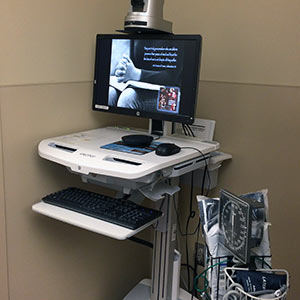What do you picture when you think of a hospitalist? You picture a physician who goes from room to room in the hospital, checking on patients and directing their care, right? For the neurohospitalists of OSF HealthCare Illinois Neurological Institute (OSF INI) – the specialists who direct the neurological care of hospital patients – that picture is only partly accurate.
Based in Peoria, OSF INI neurohospitalists deliver care the traditional way at OSF HealthCare Saint Francis Medical Center. But thanks to videoconferencing technology, the specialists began in January rounding daily on patients at OSF HealthCare Saint Joseph Medical Center in Bloomington and OSF HealthCare Saint James – John W. Albrecht Medical Center in Pontiac.

The OSF INI neurohospitalist telehealth cart.
Manning a multiscreen computer work station, the specialists conduct neurological assessments and follow-ups face-to-face with Bloomington and Pontiac patients.
The neurohospitalists conduct their visits using a telehealth cart with a camera and a screen, pushed from room to room by an advanced practice provider or a charge nurse who can perform any hands-on tasks that are required.
“We can control the camera and interact directly with patients,” said Deepak Nair, MD, one of the specialists of the tele-neurohospitalist program. “We see the patient, the patient sees us. We can do neurological assessments. We can document findings in our electronic medical record and communicate directly with the local teams. It is as close to being there in person as you can get.”
And thanks to electronic medical record software, the specialists can receive patient updates and communicate their instructions to all hospital staff, regardless of the shift they work.
Setting the standard
Arun Talkad, MD, was the initiator of the program and the first neurohospitalist to use the technology live. As the medical director of stroke for OSF HealthCare, his priority is to create a standard of stroke care for every OSF HealthCare hospital in Illinois, of which there are currently 12.
“We’re starting to standardize the clinical care we deliver across our health care system,” Dr. Talkad said. “Many of the hospitals in our system don’t have access to those skillsets in not only stroke care but all the neurological care we provide. Technology helps us bring our expertise to every OSF HealthCare hospital.”
Getting results
With neurology specialists available at OSF Saint Joseph and OSF Saint James every day of the week, and a third-party provider available for emergency overnight evaluations, the program has improved the timeliness of neurological evaluations. Patients at those hospitals are no longer waiting a day or more for a neurological consultation.
Dr. Talkad and Dr. Nair believe the program will lead to a decrease in the length of stay for patients with neurological needs and a decrease in patient transfers due to a lack of on-site neurological expertise.
The number of patient encounters doubled for the tele-neurohospitalists from the first week to the second. Dr. Nair believes it is a sign the program has been well-received, and people are finding value in it.
“It’s been quite successful so far,” Dr. Nair said. “We’re changing how we deliver service so people can stay in their hometown and get quality, expert service. It lowers cost to patients and removes inconvenience.”
